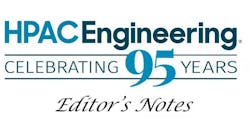Based on a study of the Leadership in Energy and Environmental Design (LEED) project database, Yudelson Associates has released a new white paper, “Green Building Trends in Higher Education,” covering green building on campus. The white paper can be downloaded from Yudelson Associates’ Website at www.greenbuildconsult.com/books/#new.
Green-building consultant, Jerry Yudelson, principal of Yudelson Associates and author of 12 green-building books, said that U.S. campuses now host more than 3,000 LEED-registered projects, about 15 percent of the total of all LEED projects. Moreover, with nearly 600 LEED-certified projects, U.S. colleges and universities have found a practical and visible way to demonstrate their commitment to sustainable practices.
According to the white paper, based on end-of-2009 data from the U.S. Green Building Council, the four leading campuses for LEED project registrations are, in order, the University of Florida, Harvard University, the University of California at Santa Barbara, and the University of Washington. The rapid growth in LEED registrations at leading campuses has come from their adoption of LEED as a way of certifying the sustainability of campus operations.
This is a promising change, as almost all of the building stock on college campuses already exists in any given two- to five-year period. Reducing the impacts of existing buildings is critical to meeting carbon emission reduction and green-building goals.
Jaimie Galayda, PhD, research director at Yudelson Associates, assisted Jerry Yudelson in the preparation of this white paper. Galayda said that there is more going on at the campuses than just LEED certification.
“Going beyond the LEED rating system, the Association for the Advancement of Sustainability in Higher Education (AASHE) recently released its Sustainability Tracking, Assessment, and Rating System (STARS),” she said. “This new campus sustainability rating system incorporates a number of criteria that evaluate green building achievements.”
Additionally, the new white paper notes that the Sustainable Endowments Institute’s (SEI) Green Report Card ranks campuses according to their sustainable achievements. Several of their criteria address green buildings specifically. The growing popularity of these rating and ranking systems is putting more pressure on campuses to build green, along with their interest in saving money by operating buildings more efficiently.








